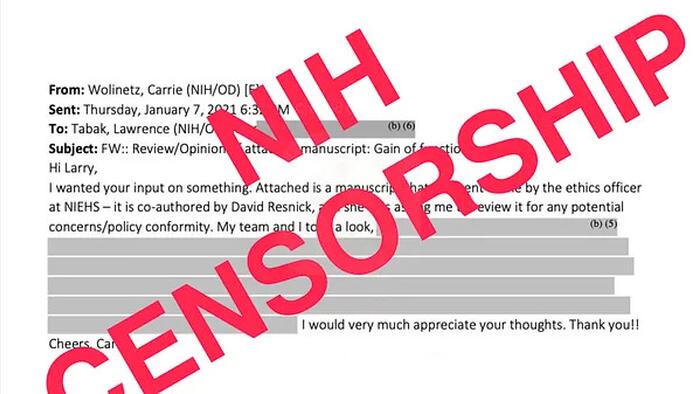The recent hiring process at the National Institutes of Health (NIH) for a new chief virologist has raised eyebrows, particularly given the context of the ongoing lame-duck period for the federal government. The very existence of a virology section at the NIH has come as a surprise, especially since the public representatives of the NIH during the COVID-19 pandemic were largely from outside its ranks. This revelation is compounded by a lack of media attention toward the NIH’s internal expertise, which was notably sidelined during discussions about the origins of the virus. The push for hiring a new chief now invites scrutiny regarding the motivations and implications of such appointments against a backdrop of prior censorship and controversy.
The situation becomes even more concerning when contextualized by recently released emails from early 2021, which imply a significant degree of internal censorship within the NIH itself. These communications showcase a demand from Carrie Wolinetz, a senior advisor, for the suppression of dissenting opinions among NIH employees concerning critical public health policies. The email discussions reveal how Wolinetz was particularly worried about a critique authored by David Resnick, an NIH bioethics expert, that questioned the safety and ethical considerations of gain-of-function experiments. Her concerns stemmed from the potential fallout that such discussions could have had on NIH’s credibility regarding the origins of COVID-19.
Leading up to this incident, the NIH’s then-director, Francis Collins, publicly dismissed the lab-leak theory as “outrageous,” influenced by a misleading scientific paper intended to promote the idea of a natural virus origin. This effort—with direct involvement from Collins and Dr. Anthony Fauci—has been implicated in obscuring the true nature of the pandemic’s origins. Dr. Wolinetz’s actions can be interpreted not just as a lapse in academic freedom but as a strategic effort to maintain the established narrative that placed the blame for the virus’s origins far from any involvement of NIH leadership or funding policies that might have facilitated gain-of-function research.
Notably, it took 3.5 years for Resnick’s article to finally publish, during which time the narrative surrounding COVID-19’s origins had become increasingly complicated and fraught with skepticism. His eventual publication arrived at a time when the credibility of the natural origin theory was faltering. In this piece, he acknowledged the serious implications of a laboratory-related accident as a potential cause of the pandemic, highlighting the urgency of accountability in both scientific governance and public health policy. The total disregard for dissenting voices within the NIH exposes systemic issues of authority and control that may deter honest discourse and scientific integrity.
The ramifications of these discoveries are profound, particularly as they echo strategic decisions made at the highest levels of the NIH. Despite the agency’s large annual budget and its assembly of skilled scientists, leadership chose to overlook internal expertise in favor of select external voices whose careers depended on NIH funding. This decision raises significant questions about the reliability of the information disseminated during the pandemic and the integrity of the scientific process being followed. These hand-picked scientists, including influential figures involved in the Proximal Origin paper, seem to have conflicted interests that challenge the credibility of their conclusions and recommendations.
Moreover, the quest for a new chief virologist may signal an ongoing failure to address these shortcomings while revealing an alarming pattern of silencing voices critical of flawed governmental narratives. The emails indicate a broader culture of fear within the NIH that may discourage scientists from speaking out against established leadership or challenging prevailing views, suggesting a need for substantial reforms. It may be essential not just to re-evaluate specific policies but to reassess the NIH’s overarching goals and methods to ensure they align with the principles of scientific inquiry and public accountability.
In summary, the scathing examination of the NIH’s leadership decisions, particularly regarding its handling of COVID-19’s origins, highlights a troubling trend of censorship and the exclusion of vital in-house expertise. The recent hiring of a new chief virologist amid this backdrop raises questions about the integrity and transparency of the NIH’s operations. Given the compromises made in the pursuit of maintaining a specific narrative, there is an immediate need for a comprehensive overhaul of the organization. This ensures that such lapses in ethics or accountability do not recur, especially as the public continues to grapple with the aftermath of a pandemic profoundly influenced by these structured failings.

